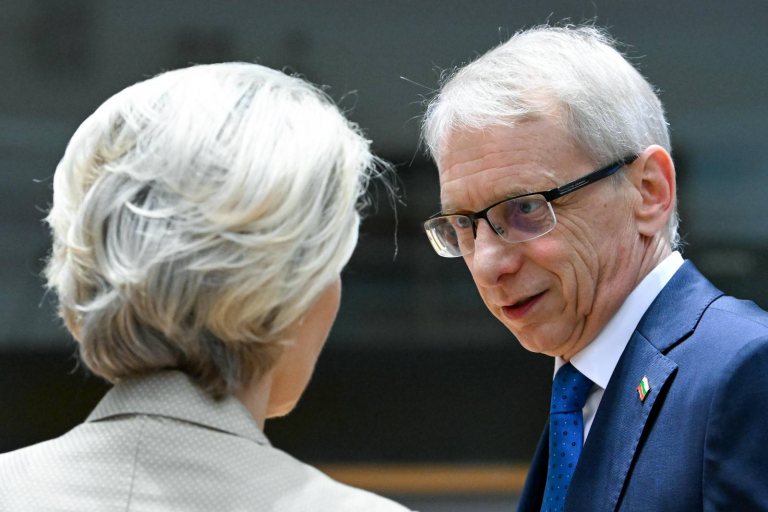
26.10.2023
Bulgaria’s leader accused Hungary and Serbia of helping feed the Kremlin’s “war machine” by failing to seek alternative energy supplies in an escalating row over a gas-import tax.
Signaling his government has no plans to back off the levy on Russian gas that transits Bulgaria, Prime Minister Nikolai Denkov said the intent is to starve state-controlled exporter Gazprom PJSC of profits used to fund the war against Ukraine.
Hungary called the move announced this month a “hostile act,” while Serbia said the tax threatens to halt vital fuel supplies to the region.
“There was sufficient time to look for alternatives, to see that these profits are feeding the war machine of Putin,” Denkov, 61, said in an interview on the sidelines of a European Union summit in Brussels on Friday. “We cannot wait any longer. Actually, this should have happened earlier.”
The standoff lays bare the way Russian President Vladimir Putin’s invasion has reshaped energy supplies in the region, where the disruption triggered the gravest cost-of-living crisis for consumers in decades. Gazprom’s Turkstream pipeline, which runs under the Black Sea to Turkey before crossing Bulgaria, provides key fuel supplies for several smaller Western Balkan nations as well.
Denkov, who insisted that the regulation is in line with the EU rules, said he’s open to talks with both Budapest and Belgrade. He accused the governments under Hungarian Premier Viktor Orban and Serbian President Aleksandar Vucic of stoking baseless fears of price hikes rather than engaging in talks.
The Bulgarian premier took office in June at the head of a coalition of rival parties that ended years of political deadlock in Sofia and placed the EU member of 6.5 million on a pro-European course. Historically a nation with strong ties to Russia, Bulgaria has pledged to reduce its dependency on Moscow after years of near-total reliance on Russia for gas, oil and nuclear fuel.
Bulgaria was among the first EU member states to get cut off from Russian supplies after Ukraine was invaded began last year, prompting an acceleration of long-delayed projects to secure imports from Azerbaijan and regional liquefied gas terminals in Greece and Turkey.
Denkov has also vowed to boost military support for Ukraine after several interim cabinets hesitated. A major producer of Soviet-style ammunition, Bulgaria is now looking to expand its production capacity, the prime minister said.
Bulgaria is part of a joint initiative of NATO member states in the Black Sea region, along with Romania and Turkey, to set up a mine-sweeping mission, which Denkov hopes will be deployed “very soon.”
“Yes, I am concerned” about Russia’s aggression in eastern Europe, he said. The Kremlin is “looking for restoring the power of the Soviet Union, of the Russian Empire. And in these two entities, Bulgaria was always of key interest.”
Bulgaria’s leader accused Hungary and Serbia of helping feed the Kremlin’s “war machine” by failing to seek alternative energy supplies in an escalating row over a gas-import tax.
Signaling his government has no plans to back off the levy on Russian gas that transits Bulgaria, Prime Minister Nikolai Denkov said the intent is to starve state-controlled exporter Gazprom PJSC of profits used to fund the war against Ukraine.
Hungary called the move announced this month a “hostile act,” while Serbia said the tax threatens to halt vital fuel supplies to the region.
“There was sufficient time to look for alternatives, to see that these profits are feeding the war machine of Putin,” Denkov, 61, said in an interview on the sidelines of a European Union summit in Brussels on Friday. “We cannot wait any longer. Actually, this should have happened earlier.”
The standoff lays bare the way Russian President Vladimir Putin’s invasion has reshaped energy supplies in the region, where the disruption triggered the gravest cost-of-living crisis for consumers in decades. Gazprom’s Turkstream pipeline, which runs under the Black Sea to Turkey before crossing Bulgaria, provides key fuel supplies for several smaller Western Balkan nations as well.
Denkov, who insisted that the regulation is in line with the EU rules, said he’s open to talks with both Budapest and Belgrade. He accused the governments under Hungarian Premier Viktor Orban and Serbian President Aleksandar Vucic of stoking baseless fears of price hikes rather than engaging in talks.
The Bulgarian premier took office in June at the head of a coalition of rival parties that ended years of political deadlock in Sofia and placed the EU member of 6.5 million on a pro-European course. Historically a nation with strong ties to Russia, Bulgaria has pledged to reduce its dependency on Moscow after years of near-total reliance on Russia for gas, oil and nuclear fuel.
Bulgaria was among the first EU member states to get cut off from Russian supplies after Ukraine was invaded began last year, prompting an acceleration of long-delayed projects to secure imports from Azerbaijan and regional liquefied gas terminals in Greece and Turkey.
Denkov has also vowed to boost military support for Ukraine after several interim cabinets hesitated. A major producer of Soviet-style ammunition, Bulgaria is now looking to expand its production capacity, the prime minister said.
Bulgaria is part of a joint initiative of NATO member states in the Black Sea region, along with Romania and Turkey, to set up a mine-sweeping mission, which Denkov hopes will be deployed “very soon.”
“Yes, I am concerned” about Russia’s aggression in eastern Europe, he said. The Kremlin is “looking for restoring the power of the Soviet Union, of the Russian Empire. And in these two entities, Bulgaria was always of key interest.”